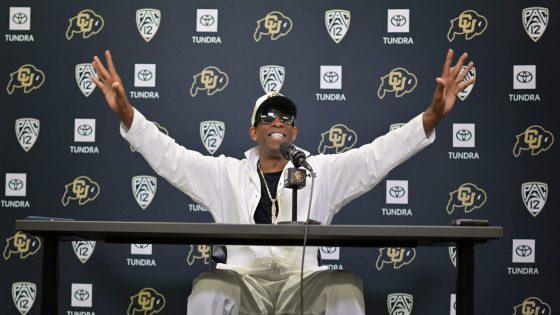BOULDER, Colo. — As Deion Sanders strolled onto the stage of a half-full Macky Auditorium on Colorado’s campus, the few hundred fans in attendance cheered and gave him a standing ovation. But something felt off.
“We couldn’t afford no theme music?” Sanders asked, drawing laughs from the crowd. “What’s going on here?”
Almost every one of Sanders’ pregame speeches to his team ends with Sanders demanding: Give me my theme music!
Last season, “Halftime” from the Ying Yang Twins instantly blared from speakers in the locker room, imploring all those in earshot to “stand up and get crunk.” Colorado’s marching band added the horns-heavy hit from 2004 to its game-day playlist.
But if anyone can rev up a room with the sheer brass of his personality, it’s the Colorado coach, whose admirers paid $64.80 to attend the 70-minute talk, which came with a copy of Sanders’ new book of life advice, followed by a meet-and-greet and photo op.
— COACH PRIME (@DeionSanders) March 27, 2024
Sanders had already made appearances last month on “The Tonight Show Starring Jimmy Fallon,” “Today,” “CBS Mornings” and Kelly Clarkson’s syndicated daytime talk show before his four-city book tour wrapped in Boulder — where Sanders at one point asked the crowd: “Who’s smoking up in here? Good Lord. … I’ve never been high, but I’ve been close here, being the coach at Colorado.
“I don’t know what y’all do, but between those 40s (the student section at Folsom Field), it goes down. Jesus Christ. We got kids in here. It was so blatant one game, I thought they was doing it on the sideline. ‘Check the bench! Who’s got the fat one?’”
Sanders touched on a wide swath of topics like his book as a “navigational system for life,” his belief Denver Broncos coach Sean Payton may draft Oregon quarterback Bo Nix, the need for more grits on menus in Boulder and the changing landscape of college sports — “nonsense,” he called it — with the home crowd.
Earlier that day, the Buffaloes held their first spring practice, the unofficial start to the second season under Sanders.
The first year, Sanders’ debut at the highest division of college football, turned Colorado from an afterthought into must-see viewing, saw an increase in applications to the school and tested college football’s accepted norms. After a thunderous 3-0 start petered out into a 4-8 season, the fascination and skepticism surrounding The Deion Way has turned to what comes next.
What has Sanders learned? What will he change? The headline-making comments haven’t stopped, like Sanders declaring that son and quarterback Shedeur Sanders and star two-way player Travis Hunter will pick the NFL teams they play for after the coming season. He’s still all in on the transfer portal and hasn’t made a single in-home visit to a recruit, he confirmed — and offered explanations for. And Deion is still talking only the biggest of goals.
“I would like to become the first Black coach to win a national championship in major college football,” Sanders wrote on page 197 of “Elevate and Dominate.” “We’re GONNA get that done at Colorado.”
As Colorado returns to the Big 12, are a winning season and a bowl game in line first? In addition to 25 newcomers via the portal (down from 87 a year ago but with more to come), Sanders’ staff has undergone an overhaul. And he’s looking at perhaps his final season as coach of sons Shedeur and Shilo, a starting safety for the Buffs.
Sanders, as it is at the core of his brand, follows a unique plan suited for no one but the larger-than-life coach. But no one can say for sure how it will go or for how long.
Jordan Seaton, the No. 1 offensive tackle in the Class of 2024, arrived a little early for his part in Colorado’s news conference kicking off spring ball. He caught Sanders’ eye and approached his coach sitting at the podium, smiling ear to ear as he settled his 6-foot-5, 285-pound frame in front of the microphone.
“Love you, boy,” Sanders said, reaching out to the jewel of his recruiting class for a hug.
“Yes, sir. Love you,” Seaton replied.
Almost four months earlier, Seaton committed to Sanders and Colorado during an appearance on Fox’s “Undisputed,” a debate show featuring Skip Bayless.
“He’s Coach Prime. Who wouldn’t want to play for him?” Seaton said.
CU Fans I recently dropped my first week of spring ball, Click Here To Watch 🍿🍿 https://t.co/vZHuNxK6eO pic.twitter.com/EhomxaCe0A
— Jordan Seaton (@JordanSeaton_) March 21, 2024
When Seaton visited other schools, he said, they told him how great he was. The first time he came to Boulder and met Sanders, the coach quickly pointed to three areas he needed to improve.
“You’re trying to elevate me, and I’m not even here,” Seaton said. “You’re investing in me, you want me to win, and I haven’t even come to your school yet.”
Sanders’ past three classes (going back to his Jackson State tenure) have featured five-star headliners in Seaton, Hunter and No. 1 cornerback prospect Cormani McClain but have lacked the depth of other programs winning at the level Sanders aspires to.
His gridiron bona fides and magnetic personality attracted one top-flight talent at Colorado’s biggest position of need, but Sanders’ big-picture recruiting approach has spawned questions about whether an overall class ranking of No. 22, per the 247Sports Composite, could be better if Sanders not only focused more on recruiting high school players — he signed just eight in this class — but also took his recruiting show on the road.
A USA Today report in March confirmed that Sanders had made zero off-campus contact with recruits since taking over at Colorado. It’s a wholly unique strategy. By contrast, less than a week after winning the 2022 national title at Georgia, Bulldogs coach Kirby Smart and his staff organized an effort to visit 100 high schools in one day, with Smart making a slew of visits himself.
Midway through his time on stage at his book event, Sanders paused and addressed the recent controversy, saying he didn’t have to watch his words in front of the home crowd.
“Coach Prime don’t go on no visits. And?” Sanders said. “My people want to come see my house. They don’t want me to come to they house. Right?”
When he brought it up again at his first news conference since November, Sanders cited several reasons for his lack of off-campus recruiting. One, he wanted to save the university money. Two, he was worried that he might upset coaches from high schools he didn’t visit. Three, the program heavily recruits transfer prospects, and players in the portal rarely have in-home visits with coaches.
And finally, he used the same anecdote that he’d used days earlier about his embarrassment when former Florida State coach Bobby Bowden visited his home, knowing rats and roaches came out at night. He said he did a “personal survey” and gleaned that players and their parents don’t want him in their homes.
In a talent acquisition business where most coaches employ a fanatical, recruiting-first mentality, Sanders’ approach could take on the distinct whiff of a laissez faire attitude. Multiple power conference assistants privately expressed to The Athletic their doubts about Sanders’ strategy and commitment to building a program.
“I have never heard one guy say I chose this college because this coach came by my crib. Have you?” Sanders said. “I can’t do the things other coaches can do. You know why? I’m Coach Prime. And I didn’t stutter when I said it.”
Sanders has made a habit this offseason of repeating a generous interpretation of 2023’s results and how close the Buffs were to winning more games.
There’s no denying the immediate impact Sanders had in Boulder, where the 2022 team had gone 1-11. But his first-year struggles, as Colorado lost eight of its last nine, left him searching for answers often.
Sanders said he could have handled some in-game situations better and wanted to be ready for them this fall. He also noted that some situations are so unique they can’t be prepared for.
Put in work in week one 💪 pic.twitter.com/xzomFbRFwr
— Colorado Buffaloes Football (@CUBuffsFootball) March 26, 2024
Sanders, who proclaims his refusal to wait on success, pressed a number of buttons in hopes of fixing what ailed his first team, including demoting offensive coordinator Sean Lewis after just eight games. Lewis, who left Kent State after five seasons as head coach to be Sanders’ offensive coordinator, was hired as San Diego State’s head coach after the season.
Sanders has turned to building a staff with NFL experience. Seven of Colorado’s 10 on-field coaches, in addition to Sanders, played or coached in the NFL. But in all, just three assistants are doing the same job they were when the 2023 season began.
“You have to take your time and truly be prayerful to understand who is in your room and who you bring in. Sometimes you think it clicks, and it just don’t click. It just don’t work,” Sanders said. “That’s not saying a guy is a bad guy or bad person, but it may not work for you and may not work for me. Sometimes it didn’t. That does not mean they can’t go somewhere and soar.”
He promoted former NFL coach Pat Shurmur to permanent offensive coordinator and hired Robert Livingston from the Cincinnati Bengals as a first-time defensive coordinator. Offensive line coach Phil Loadholt and outside linebackers coach Vincent Dancy are first-time position coaches.
Shurmur said he expects to lean on what the offense did well a season ago and incorporate his own concepts with a full offseason to install them.
“He understands me,” Shedeur Sanders said.
Shurmur was tight-lipped on specifics, but he said much of what he adds may be “way different” and that he’s keeping an eye on trends across the sport to incorporate into Colorado’s new-look offense.
“Believe it or not, they’re doing the same things in the Kansas City Chiefs building,” Shurmur said.
Sanders, a father of five, said it set in a while ago that his time coaching Shedeur and Shilo is short.
“I’m a real dad, which means we have a tremendous relationship and we communicate often and daily,” Sanders said. “It’s phenomenal to think it’s been a tremendous journey. I’m thinking about it.”
Sanders says he refuses to hire “coaches who are estranged from their children.”
“How can I expect you to be a blessing to another young man and lead him and raise him and encourage him and motivate him and teach him and instruct him when you’re not even doing that with your own child?” Sanders asked the crowd at Macky Auditorium, sparking raucous applause.
Earlier this week, Sanders introduced Pro Football Hall of Famer Warren Sapp as a graduate assistant. Sapp has no previous coaching experience and in 2015 pleaded no contest to misdemeanor domestic battery and was separately arrested on misdemeanor charges of assaulting and soliciting a prostitute, reaching a plea agreement with authorities. In a statement provided to USA Today, Colorado said Sapp completed a background check and athletic director Rick George met with Sapp to “articulate the department’s standards and expectations, to which he acknowledged and agreed.”
Sanders’ self-assured attitude about his approach to coaching on and off the field is polarizing. He explained where it comes from in part on his book tour.
Sanders’ biological father was, in Sanders’ words, a drug addict, and he had a stepfather whom he describes as an alcoholic who was abusive to his mother, a custodian at a local hospital. Sanders looks back now in shame at his teenage self who used to tell people his mother was a nurse, and it’s part of why he says he goes out of his way to be kind to those who clean Colorado’s team facility.
“I overly love my kids because I never heard that word from another man,” Sanders said. “Nobody had ever told me they loved me. Nobody told me they appreciate me. Nobody told me, ‘You good, boy. Do your thing.’
“So a lot of the things you see, the flash, the confidence, the articulation and communication ability is something I had to manifest in myself. That’s why you gotta stop judging folks. … I had to build up this alter ego because there was nobody there. I had to build up that Prime. I had to build him up so he was self-sufficient, self-contained, self-motivated. I didn’t need your claps. I didn’t need your love. I had to give myself that.”
At Colorado, Sanders does things his way, leaning on new-school tendencies by embracing social media, friendly podcasts and YouTube while leaning on the old-school sensibilities he was taught as a player.
Players’ shirts must be tucked in when they’re in the weight room. There are no hats, hoodies or jewelry allowed in team meetings. Players’ socks must be pulled up and can’t be wrinkled. Meetings? Players better be 15 minutes early.
“You never know when the meeting is going to start,” Seaton said. “We got an 8 o’clock meeting, it might start at 7:42. It might start at 7:53.”
The Buffaloes added seven more offensive linemen around Seaton. Colorado gave up more sacks last season than all but one FBS team and ranked last in yards per carry. Sanders criticized the line play publicly.
“You guys knew, too. But it’s funny that when I say it, it’s a problem. Why is that? When I say what everybody’s thinking, why is it a problem?” Sanders asked.
Sanders told the crowd at Macky Auditorium that the O-line additions have him feeling “eight times” better about the upcoming season.
Sanders’ class of transfers ranks sixth nationally by 247Sports. Heading into the April portal window, only Louisville has taken more transfers than the Buffaloes’ 25.

GO DEEPER
Deion Sanders and Colorado are undergoing more change. What will it mean on the field?
The ever-changing faces underneath Sanders on the Colorado organizational chart will make his second season in Boulder an only slightly less ambitious experiment than the full overhaul a season ago. But college football is changing, too. Colorado left the Pac-12 after 13 seasons to return to the Big 12, which it called home from 1996 to 2010. But this Big 12, with no Oklahoma, Texas, Texas A&M or Nebraska, is not the Big 12 that Colorado left behind. And the College Football Playoff will expand from four teams to 12. Sanders said in January the Buffaloes can “definitely” qualify for this year’s field.
Last year’s team surpassed oddsmakers’ expectations, winning four games when Vegas sportsbooks set the over/under for wins at 3.5. This year, that number is up to 5.5.
Visit Boulder, the Convention and Visitors Bureau, estimated that Sanders generated an economic impact of $113.2 million for CU’s six home games last season. Hise O. Gibson, a professor at Harvard Business School, has undertaken a yearlong study of the full economic impact of what’s come to be known as the “Prime Effect.” The results are scheduled for release later this month.
But whether Sanders’ plan can take a major program to meaningful titles will continue to be debated throughout 2024, when more data is fed into the content machine that is Colorado football. The Buffs’ spring game is set for April 27.
“Everybody, including the staff, wasn’t built for the noise. Everybody’s not built for the moment,” Sanders said. “We took the moment to the greatest heights, and we plan on doing that again. But everybody’s not built for that stage. That stage comes with tremendous responsibility, and you gotta get young men who are used to that, committed to that and want it and relish that opportunity to be on that stage.
“And they’re ready to grab that microphone and hit that note.”
For all the skepticism surrounding Sanders’ compelling, curious blueprint to program building, he has at least one believer outside Boulder.
This offseason, Sanders’ phone buzzed. He looked down and saw a text message from Terry Saban, the wife of recently retired coaching legend Nick Saban, whom Sanders considers a mentor and friend. The duo was a fixture on commercials as Aflac insurance pitchmen throughout the past two seasons.
“Hang in there, Coach Prime,” the message read. “You’ll dominate sooner or later.”
(Photo: RJ Sangosti / MediaNews Group / The Denver Post via Getty Images)



